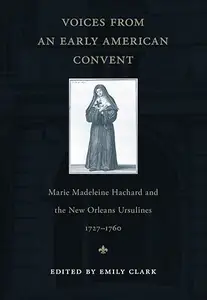
Free Download Emily Clark, "Voices from an Early American Convent: Marie Madeleine Hachard and the New Orleans Ursulines, 1727-1760"
English | 2007 | ISBN: 0807132373, 0807134465 | EPUB | pages: 138 | 0.6 mb
In 1927, twelve nuns left France to establish a community of Ursuline nuns in New Orleans, the capital of the French colony of Louisiana. Their convent was the first in the territory that would eventually be part of the United States. Notable for establishing a school that educated all free girls, regardless of social rank, the Ursulines also ran an orphanage, administered the colony's military hospital, and sustained an aggressive program of catechesis among the enslaved population of colonial Louisiana that contributed to the development of a large, active AfroCatholic congregation in New Orleans. In Voices from an Early American Convent, Emily Clark extends the boundaries of early American women's history through the firsthand accounts of these remarkable French female missionaries, in particular Marie Madeleine Hachard.
The heart of the volume consists of letters that Hachard wrote to her father in Rouen describing the physical and emotional ordeal of crossing the Atlantic, the startling combination of strangeness and familiarity of Louisiana, and the exhilaration of participating in a unique missionary adventure. Biographies of pioneering Ursulines, written as obituaries by the nuns who survived them, pick up the missionaries' story. Clark also includes a contemporary account of the festive procession the nuns made through New Orleans in 1734 to their newly constructed convent compound. These fascinating documents reveal early American women of determination, courage, and conviction who turned their backs on the traditional roles of wife and mother to embrace lives of public service. From within their cloister they made an indelible impact on the lives of early colonists.
Voices from an Early American Convent allows readers to see early Louisiana from the perspective of women whose eyes rest on the domestic details of colonial life-foodways, clothing, children-largely ignored by the more familiar accounts penned by male officials and adventurers. The words of these women reveal their work in forging community among the diverse inhabitants, enslaved and free, who occupied early New Orleans.
"Our city is very beautiful, well constructed and regularly built, as much as I am able to know of it from what I saw the day of our arrival in this land. . . . It is enough to tell you that here one publicly sings a song in which there is only this city which resembles the city of Paris. This tells you everything."-Marie Madeleine Hachard, in a letter to her father
AUTHOR BIO: Emily Clark is an assistant professor of history at Tulane University. She worked as an archaeologist, social worker, and university vice president before returning to graduate school in midlife to pursue a Ph.D. in history. She is a native of New Orleans, where she was educated in public schools and at Tulane University.
